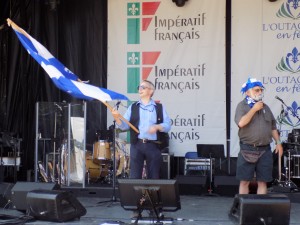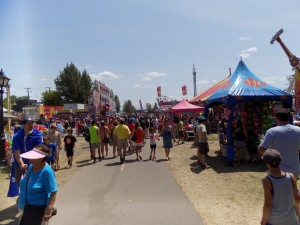St. Jean Baptiste Day: Quebec’s holiday
Americans are getting ready for Independence Day on the 4th of July. Canadians have just celebrated the 149th anniversary of their country on July 1—Canada Day. In Quebec, June 24 is St. Jean Baptiste Day, officially known as Fête Nationale.
June 24 is when the Christian church traditionally celebrates the birth—or nativity, of John the Baptist. French colonists, who were all Roman Catholic, began celebrating the day when they arrived in New France, as much of North America was originally known.
The first recorded evidence of a celebration is from 1606. By the late 19th Century, St. Jean Baptiste took on a more patriotic tone in addition to its religious significance. In 1908, Pope Pius X made St. Jean Baptiste the patron saint of all French-speaking Canadians, even those outside Quebec.
In 1925, St. Jean Baptiste day became an official holiday in Quebec. When Quebec nationalism, cultural identity, and support for separation became more prominent in the 1960s, the religious aspect of the holiday declined. Culture, language, and politics became more prominent. In 1977, the day became officially called Fête Nationale although most people still call it simply “St. Jean Baptiste” or “St-Jean.” People wish each other a “Bon St. Jean” (literally “Good St. John) before and on the big day. It’s an ironic greeting to hear in a place where the Roman Catholic Church once dominated most aspects of daily life but now struggles to keep parishes open.

Gatineau city council member Mike Duggan (left) and Imperatif Francais President Jean-Paul Perreault (right). Photo by James Morgan
Huge St. Jean Baptiste celebrations take place every year in Montreal and Quebec City. In the Outaouais region, as the part of Quebec around Gatineau and Ottawa is known, the biggest celebration is in Aylmer, a former town within the city of Gatineau. Outaouais en fête actually begins the day before and features three days of concerts, a carnival, and a parade. It all takes place on Aylmer’s waterfront by the Ottawa River. Prominent French-language musicians from across Quebec and Canada take part. The parade in Aylmer is actually more of a procession, it’s an eco-friendly event with no fossil-fuel powered vehicles. Anyone can participate too. It started at a mall parking lot and made its way down Aylmer’s main street to the waterfront. The procession was about a quarter of a mile long and was a solid strip of blue and white, the colors of Quebec’s flag.
Although traditionally a French-Canadian holiday, the multicultural reality of today’s Quebec means that St. Jean has become a holiday for all who call Quebec home. I chose to settle here five years ago when I began studies at the University of Ottawa. I grew up in very un-French parts of Ontario and often around people who did not understand or appreciate the uniqueness of Quebec.
The reality of Quebec’s cultural diversity was front and centre at the St. Jean celebrations in Aylmer. A bagpiper led the parade down the street. He played the usual Scottish songs, but also played Gens du pays, Quebec’s unofficial anthem.
William Amos and Greg Fergus, two federal Liberal Members of Parliament from the Gatineau area participated in the parade. Both have English names and Fergus’ ancestry is from Montserrat in the Caribbean. City Council member Mike Duggan addressed the crowd on the stage by the waterfront, standing next to Jean-Paul Perreault, President of Imperatif Français, a French language and cultural organization that is also one of the main organizers of the St. Jean celebrations. Almost two centuries ago, a whole branch of my own family—all English speaking, settled on the wild and remote north shore of the Gulf of St. Lawrence in the far eastern part of Quebec in an outport fishing village that is still only accessible by boat to this day.
St. Jean Baptiste/Fête Nationale is a day for French Canadians in Quebec and across the rest of the country to celebrate their heritage and for all people in Quebec to celebrate the distinct and vibrant culture of our home.










